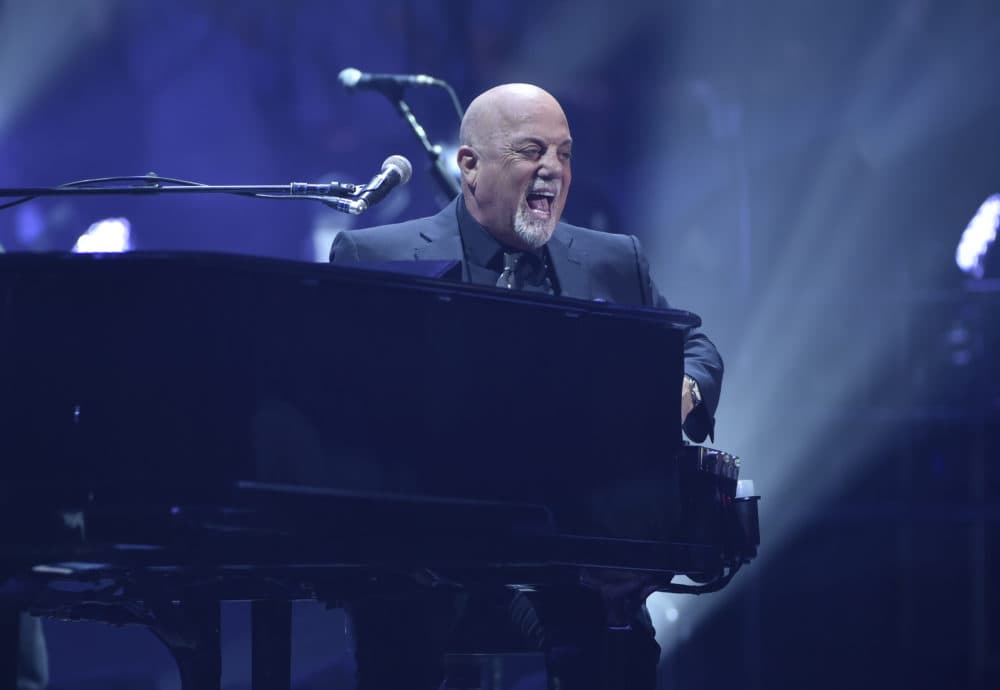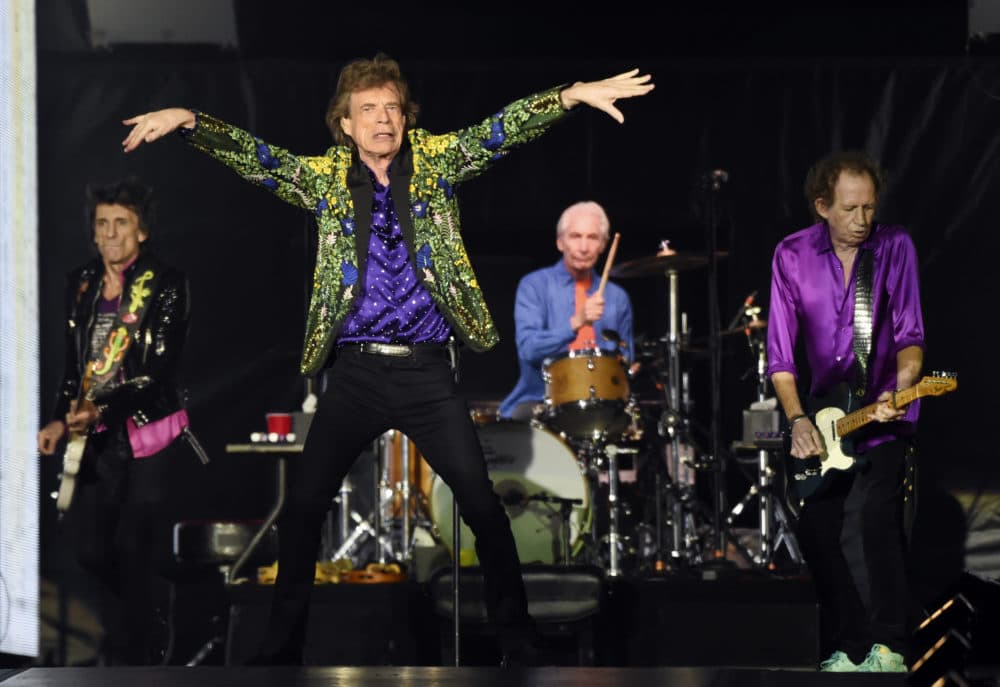Advertisement
How To Be An Aging Rock Star In The 21st Century

Billy Joel is not writing new songs or making new albums. When Billboard asked the 70-year-old troubadour last year how the music industry had changed since his recording heyday, he replied with a curt “The fact that it’s gone.”
But he’s not done, not even close. Joel’s fans will get to hear his hits when he plays live. Which is often. He has a monthly residency at Madison Square Garden and plays another Fenway Park show this coming August.
“Look, it’s a young man’s job. It’s a Peter Pan career, you know?” Joel told Pollstar, the music industry touring magazine, in May. “You start out as a teenager, playing in rock 'n' roll bands, and you continue to do this, into your 70s and 80s? I’m seeing these geriatric rockers, they're still going. … Yeah, well, who am I to stop in my 70s if they're still doing it in their 80s? The concept of retiring is getting more and more obsolete… The audiences are better than they’ve ever been. There’s more people coming. I play these phenomenal venues, and I make a ton of money. Why should I stop doing that?”
Not many, of course, are at Billy Joel's level, but he’s far from alone. For rockers of a certain age — let’s say over 50 — if they’re going to make a living, it’s through road work.
For rockers of a certain age -- let’s say over 50 -- if they’re going to make a living, it’s through road work.
Just look at the rock acts, both large and small, that have played Boston area gigs this fall, or will play this winter: The Cult, Elton John, Fleetwood Mac, Cher, KISS, Steely Dan, Bob Seger, Eagles, Stiff Little Fingers, The Avengers, B-52s, Flipper, My Life with the Thrill Kill Kult, Los Lobos, the Undertones, Bob Mould, Cracker, Marc Cohn, Swervedriver, Herman’s Hermits, Midge Ure, Bow Wow Bow, the Motels, and the Rascals.
Consider Flipper. “We’re pretty low on the totem pole in terms of bands that are earning money out on the road,” says Steve DePace, drummer for the 40-year-old punk band. In October, they played Cambridge’s Middle East Downstairs. “But in terms of necessity, bands are figuring out they have to make their money on touring and merchandise. And we’ve always had a great time out on the road.”
“It’s been a long time that bands haven’t made money on their recordings and it’s gotten worse,” DePace adds. “In recent years we’ve gone from downloads, where people pay a buck a song, to streaming and you literally get paid a fraction of a penny per play.”
Advertisement
Streaming revenue may be negligible for most artists — and rock ‘n’ roll may be second (or third?) fiddle on the streaming charts these days — but it’s far from dead. As a concert experience, it’s thriving.
Ray Waddell, who both writes for Pollstar and is president of Oak View Group, which owns the magazine, considers this a “golden era for live entertainment,” citing rising ticket sales across the board. “Virtually every segment of the business is thriving, from clubs and theaters to amphitheaters and arenas, to stadiums and festivals. We’re optimistic it will continue to flourish for years to come, barring unforeseen circumstances. “
The old paradigm was: You make an album and tour to support that album’s sales. The new reality — especially for Baby Boomer rockers who made a name for themselves in their youth -- is that making a new album is hardly crucial.
These veteran bands sometimes make new albums — it does send a signal they're still vital and not coasting on old hits (if the album's good) — but they don't need to make new albums to stoke interest. It’s also true that for rockers, most of their best music is made when they’re in their 20s and 30s. So, there may be a burst of excitement about a new release, but it rarely sustains. The term often used to describe these groups is “legacy bands.” What they do is tour. Fans want the old hits.
“The Who, Elton John and, especially, The Rolling Stones have reset the clock in terms of rock ‘n’ roll retirement. “The Stones look at the old blues musicians, who perform well into their 90s or until they keel over on stage,” says Waddell. “What I hear from artists I speak with is they want to play live for as long as they feel like they sound good and fans still want to see them. Of course, biology takes over at some point.”

It’s not all fun and games. “Touring has never been particularly easy, at whatever level people do it,” says Hugo Burnham, original drummer for the English post-punk band Gang of Four, “but if you want to be a working musician, you actually have to work. It looks glamorous from afar. It feels glamorous for the first few times you are doing it. But it ain’t all sparkles and joy.”
Burnham participated in a 2005 reunion tour but opted out further engagements. "But," he says, during the band’s first go-round, “I loved it. I could never quite get over my good fortune that I made a living for a few years from being a working, touring musician. I got to see much of the world for free, sort of, without having to wear a uniform and carry a weapon.”
We first saw the shift from album sales to tours about two decades ago. “Like a bankruptcy in America, it happened slowly and then all at once,” says Waddell. “Revenue streams from record sales and publishing began to dwindle and, for legacy bands, virtually dry up. But the gates flew open for the live business. Artists that were great live performers began reaping the financial rewards not only from ticket sales but also ancillary revenues like sponsorships and merchandise.”
"Revenue streams from record sales and publishing began to dwindle and, for legacy bands, virtually dry up. But the gates flew open for the live business."
Ray Waddell
The Feelies, a great new wave band from New Jersey that broke through in the late-'70s and played Cambridge in September, has an alternative to relentless touring: a day job.
“I’ve had a full-time day job for 21 years,” says drummer Stan Demeski. “I play shows now mostly to spend time with my friends, like-minded musicians that I wouldn’t be able to see all at once otherwise. It’s great that people come see us and the extra money is nice, but it’s really about being with other musicians who have the same tastes and musical aesthetic. The older I get, the more I appreciate it. Unless musicians truly enjoy going out and touring, I feel bad for them. If you’re not in a popular band, it’s a tough life. I’m relieved to not be a professional musician anymore. Semi-pro is it for me.”
And for fans considering going to the gig, there’s always this nagging thought, echoing the line in the Rolling Stones’ 1965 song “The Last Time” — “This could be the last time/ Maybe the last time/ I don’t know — oh no, oh no.” You just know there’s a lot of people ruing that they skipped Prince, David Bowie, Motorhead or Buzzcocks last time they played town.

